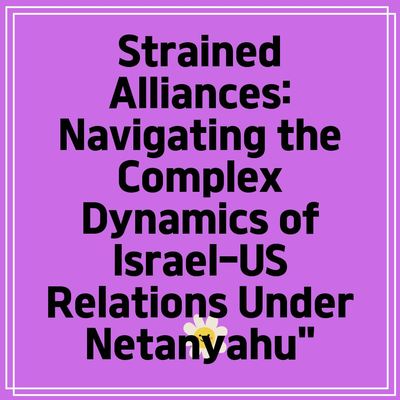
Netanyahu Commands, US Obeys: Analyzing Recent Developments in Israel-US Relations
In recent weeks, the geopolitical landscape of the Middle East has become increasingly complex, particularly regarding the relationship between Israel and the United States. Under the leadership of Prime Minister Benjamin Netanyahu, Israel has taken decisive actions that have evoked strong responses and reactions from the US government. Understanding the dynamics of this relationship is crucial, as the two nations continue to play pivotal roles in regional stability.
The Context of Israeli-American Relations
Historically, Israel has been a close ally of the United States, with strong economic, military, and political ties. However, this relationship is often tested by the actions and policies of Israeli leadership. Currently, Netanyahu’s administration has adopted a more assertive approach to decisions concerning both domestic and foreign policy, particularly regarding the ongoing tensions with Palestinian authorities and neighboring nations.
Decisions Made by Netanyahu
The latest directives from Prime Minister Netanyahu reflect a commitment to bolster Israel’s security stance, particularly in the face of perceived threats. Recent military operations aimed at neutralizing militants in the Gaza Strip and the West Bank have made headlines. These operations have been justified as necessary for Israeli self-defense, positioning the Netanyahu administration as a strong proponent of national security.
Significantly, Netanyahu’s government has also focused on expanding settlements in contested territories, a policy that has historically strained relations with the Palestinians and drawn criticism from various international bodies. This controversial expansion has further highlighted the complexities of US support, as it poses challenges to diplomatic efforts aimed at peace.
US Response and Compliance
The Biden administration’s reaction to Netanyahu’s latest commands underscores a delicate balancing act. While expressing support for Israel’s right to defend itself, the US has refrained from overtly endorsing all of Netanyahu’s actions, especially those that may exacerbate tensions in the region.
Nevertheless, there have been instances where US approval appears implicit. Recent military aid packages and diplomatic endorsements suggest a continuation of America’s historical role as a staunch ally of Israel. Critics argue that this unconditional support allows for actions which may not only destabilize the region but also conflict with international norms and human rights considerations.
The Broader Implications for Regional Stability
As Netanyahu continues to issue commands that shape Israel’s military and territorial strategy, the implications for wider Middle Eastern stability cannot be understated. The involvement of neighboring nations such as Iran, and the impact of shifting alliances, further complicate this situation. Regional powers are closely watching these developments, as any misstep could lead to increased tensions and potential conflict.
Moreover, in an age of heightened scrutiny regarding human rights and international law, the actions taken in response to Netanyahu’s directives may prompt protests and calls for action both domestically within the United States and across the globe.
What Lies Ahead?
The future of Israel-US relations under Netanyahu’s command remains uncertain as conflicting interests surface. For Israel, maintaining a robust security posture is essential; for the US, navigating the complexities of its foreign relations while adhering to its values presents a significant challenge. The intertwining of these geopolitical strategies will undoubtedly shape the fate of the region.
In the coming months, observers will closely monitor the actions prompted by Netanyahu’s leadership and the US’s subsequent reactions. Diplomatic efforts aimed at mediating between the involved parties could emerge as vital in ensuring a degree of stability, but the question remains: will the US continue to obey Netanyahu’s commands unconditionally?
Conclusion
The nuanced interplay between Netanyahu’s directives and the US’s compliance illustrates the intricate dynamics of international relations. As both nations confront enduring challenges in the Middle East, understanding their intertwined fates is crucial for any analysis of the region’s future. With tensions running high and actions from both sides scrutinized, the path ahead requires careful navigation, strategic foresight, and a commitment to pursuing peace over aggression.
As we continue to monitor these developments, it is evident that the relationship between Israel and the United States will remain pivotal in shaping not only their domestic policies but also the broader regional landscape in the years to come.


